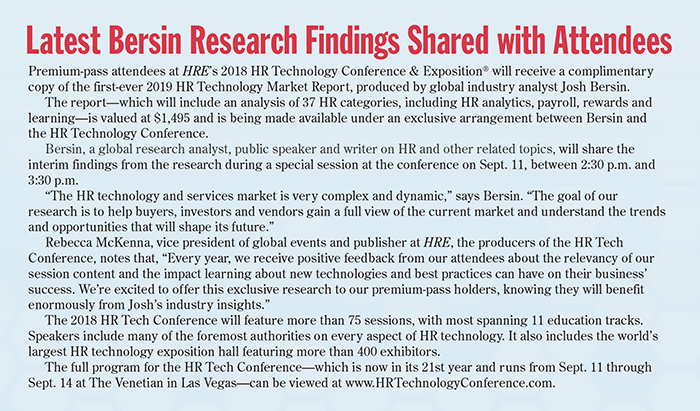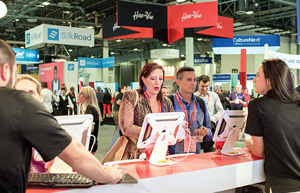What is the best strategy to achieve customer success?
That is a major theme of the 2018 HR Technology Conference & Exposition®, which is designed to help HR leaders and their organizations succeed with HR-technology programs, execute HR and talent strategies, provide solutions and user experiences for their employees, and finally, maximize their return on investment of those solutions.
What makes this idea of “success” with HR technology more important than ever? There are three primary reasons.
First, the HR-technology market continues to grow in size, capability and complexity (we expect up to 400 HR-tech providers to exhibit at the conference this year), making the assessment, selection and eventual implementation of HR-technology solutions more difficult than ever. With so many choices, a rapidly evolving market and almost constant change in the form of mergers and acquisitions, HR leaders need more resources, knowledge and interaction with the technology market in order to improve their chances for success.
Second, while I don’t like to trot out the trite phrase “war for talent,” it is hard to come up with another concise and accurate way to describe how challenging many, recruiting and retention environments are across industries and geographies. In the U.S., unemployment is at a near-two-decade low, and posted job openings are touching all-time highs since the Bureau of Labor Statistics began tracking them in 2001. Also, the recent “quits rate”–the percentage of employed workers who voluntarily leave their jobs–is also at or near a record high. In fact, there are even fewer American workers who are officially counted as unemployed than there are open job postings. These labor-market data serve to reinforce what most HR and business leaders understand: Whether or not we like the “war for talent” descriptor, finding and retaining workers is an organization’s primary HR challenge–and it doesn’t look to be getting any easier in the short term. In this environment, many HR leaders and organizations are increasingly looking for HR-technology solutions to help them better compete for talent, engage employees and foster workplace environments at which the best talent wants to remain.
Lastly, in an environment in which talent has more and more of the power and leverage, organizations are turning to HR-technology solutions that can help them craft what’s come to be dubbed in the last few years as a compelling “employee experience,” a holistic way to describe how an employee thinks and feels about working with and for his or her employer. This employee experience is influenced by physical elements such as the workplace, its location and the commute, and also by HR and workplace technologies that the organization provides. Advances in the capability, utility, design, user experience and sheer ubiquity of modern consumer technologies for entertainment, social networking, shopping and more have raised the expectation levels for HR and workplace technologies almost commensurately. Said differently, if employees have wonderful, simple, fun and productive experiences with the technology they use in their personal lives–such as for booking travel, banking, reading the news, watching sports highlights and arranging a ride share–they are bringing these same high expectations to the HR and workplace tools their organization provides. When evaluating and deploying such technologies, HR and business leaders are challenged not only to meet the basic functional requirements of a particular process (such as completing an accurate payroll) but also to deliver a user experience that is attractive, interactive, easy to use and information-rich, such as a paystub that is delivered to an employee’s smartphone as soon as the payroll process is complete.
These three primary drivers of increased pressure on HR leaders (and, to be fair, the HR-technology providers as well) formed the foundation for the design of this year’s HR Tech Conference, including the program, the expo and the overall attendee experience. At the conference, HR leaders will be able to gain insights that will help them on the road to success with HR technology, as they navigate the ever-changing HR-technology-market landscape, the highly competitive labor and talent market and demands from employees for better, consumer-like HR and workplace technologies.
Learning in Action
There’s never been more information about HR technology available to HR leaders: vendor-provided collateral, industry research reports that compare HR-tech providers within a functionality (ATS or workforce planning, for example), professional online networks like LinkedIn, crowd-sourced technology-review platforms (similar to Yelp or TripAdvisor but for workplace technology), a growing number of independent industry analysts and groups that are producing amazingly insightful research on HR tech, and finally, industry events like the HR Technology Conference. There is also the still-relevant collection of HR and HR-tech bloggers, and even more recently, HR podcasters producing tons of HR-technology-related content.
The burgeoning marketplace of HR-technology providers combined with the growing collection of market resources can create an overwhelming environment for HR leaders who need to understand the important, relevant HR-technology options available. With that in mind, we’ve created a set of content offerings and experiences at the HR Tech Conference to help HR and business leaders develop a better, deeper understanding of the HR-technology market and set them up for an educational experience during the event and after.
We’ll open market-education content Sept. 11 with a session called “HR Tech: An Orientation to the Conference.” John Sumser, who has been introducing people to this industry for two decades, will help participants maximize their time and return on investment for attending the conference, covering all the elements of HR technology and how they fit together. Plus, he’ll provide an overview of the HR-technology landscape to help attendees design the ideal conference experience around the areas of HR tech about which they want to learn. Apart from that orientation, there will be a series of five “Market Landscape” sessions, in which industry experts will cover specific sub-domains of the HR-technology market–payroll, talent management, learning, artificial intelligence and talent acquisition. Throughout the conference, we’ll showcase these deep-dive education sessions, which will help HR leaders understand key technology trends, latest innovations, and most importantly, guide their thinking about which solution providers may be best prepared to help them achieve success. The experts will also provide some tips and tricks to help attendees successfully navigate the HR Tech Expo.
One of the core tenets upon which the HR Technology Conference was built–and what has helped it grow to be the largest HR-tech conference of its kind in the world over the past two decades–is a commitment to providing a forum for HR leaders at the world’s most successful companies to share their efforts and successes with HR technology. As always, HR Tech will provide leaders with dozens of actionable examples and ideas for how technology can drive success across the entire employee lifecycle–from organizations that have leveraged new technologies to improve talent acquisition, to ones that are implementing modern tools for employee learning and development, and to those cutting-edge companies incorporating artificial intelligence and chatbots to engage with prospective candidates and employees. Here are just a few of the most compelling sessions during which HR leaders will share how technology is empowering their talent and business strategies:
- “How Wendy’s Built a Culture of Learning That Boosted Customer Satisfaction and Sales”
- “1,200 Percent ROI Achieved with End-to-End HCM-Cloud Technology”
- “Succeeding with HR Technology: How HR Leaders Can Bring the Elements Together”
- “From Many to One: Cox Enterprises Transforms Its Learning Experience”
- “Putting People First: Brown-Forman’s Culture-Centric Approach to Business Success”
Finally, HR technology can help create, shape and deliver a modern, effective and enjoyable employee experience. As mentioned previously, the combination of increased user expectations of how workplace technologies should look, feel, work and bring value; the rapid, dramatic advances in mobile and cloud-based HR technology, which allows faster iteration and enhancement; and a workforce that is more technology-ready than at any time in the past means the possibilities for enhancing the employee experience have never been greater. The HR Technology Conference remains the essential place where HR and business leaders can see, touch, try and learn about these new tools, some of which are being talked about publicly for the first time.
Expanding the Experience
For HR leaders seeking to truly gain the most current insights into how modern HR-technology solutions are impacting employee experiences, I would point you to the conference’s more “experiential” elements.
The HR Technology Conference Expo is the largest of its kind in the world, with all the leading HR-technology-solution providers attending. The expo is the best opportunity to get a detailed look at the newest technologies, meet with vendor representatives and executives, and take a test drive of many of these innovative solutions. Included in the expo is the Start-up Pavilion, where 60 (a record high) HR-tech start-ups will showcase their ideas, technologies and innovations–most for the first time at a large-scale event. Here, HR leaders can engage with the latest thinking, tools and designs for HR technology that may have a place in their organizations. In a new, exciting element added to the event, 30 of our Start-up Pavilion participants will compete in Pitchfest, with the winning vendor earning a cash prize and a chance to showcase its solution on one of the main stages later at the conference.
Elsewhere throughout the conference, HR-technology innovations will be showcased in a more structured, comprehensive manner. For instance, the annual and popular “Awesome New Technologies for HR” main-stage session gives up to six of the most established and largest HR-technology providers the chance to show HR leaders that innovation isn’t the sole province of tech start-ups.
In such a competitive market, even the large-market-share providers know they need to continue to innovate to compete with nimble start-ups, and keep their existing customers happy by delivering new, better, and more employee-friendly tools and solutions.
As the 2018 HR Technology Conference draws near, HR and business leaders will turn to setting business, technology and talent strategies for the new year. For many organizations, these plans will include new HR-technology investments, vendor-assessment and selection processes, implementations, and hopefully for most, success with HR technology. We strive to provide HR leaders with the deepest, richest and most complete set of resources to help them on this path. We want to help them understand this incredibly complex market, see how technology can enable them to compete for talent, and assist them in delivering great solutions and experiences for their employees.
The HR Technology Conference and Expo® will be held Sept. 11 through 14 at The Venetian in Las Vegas.

